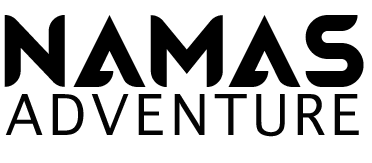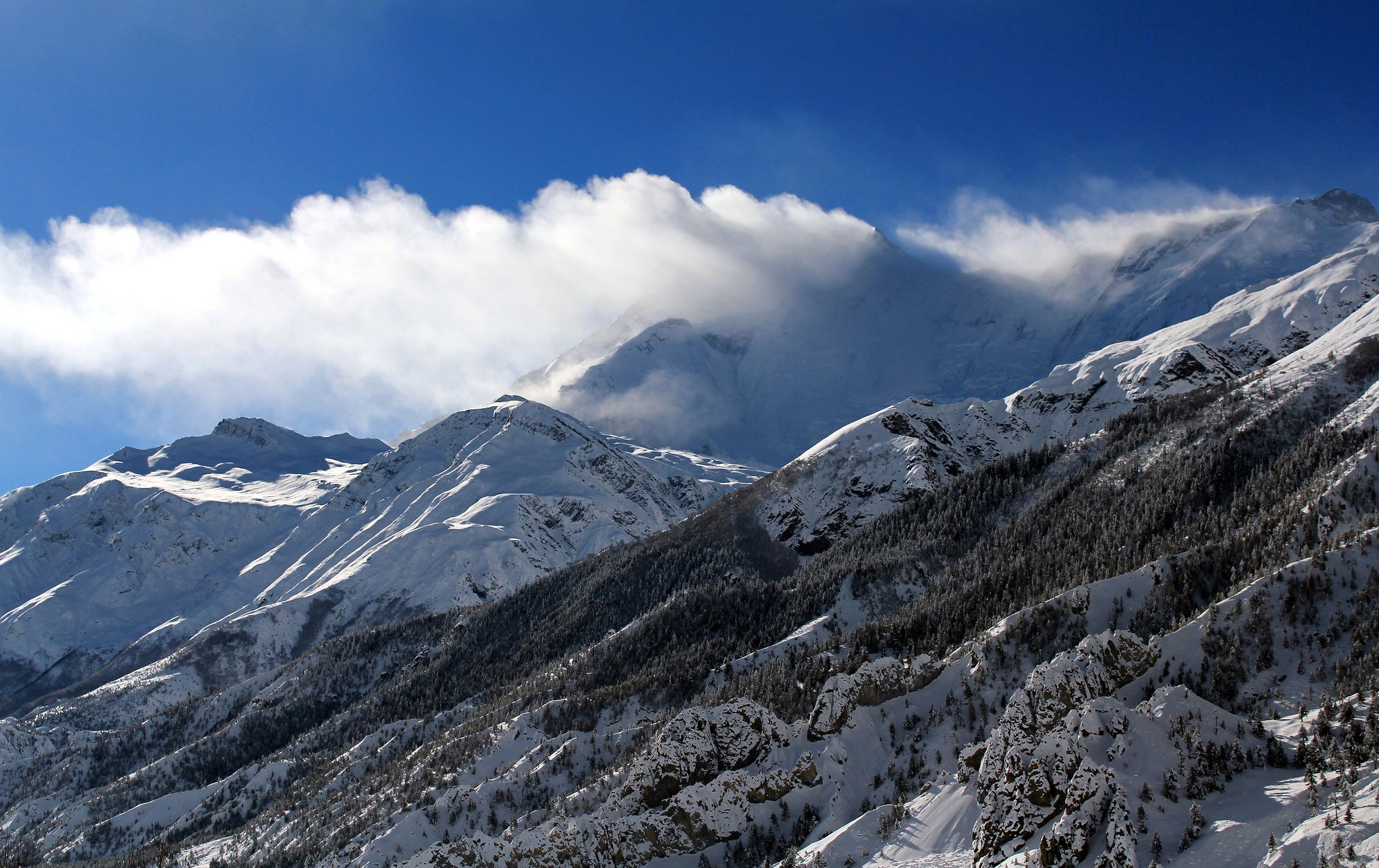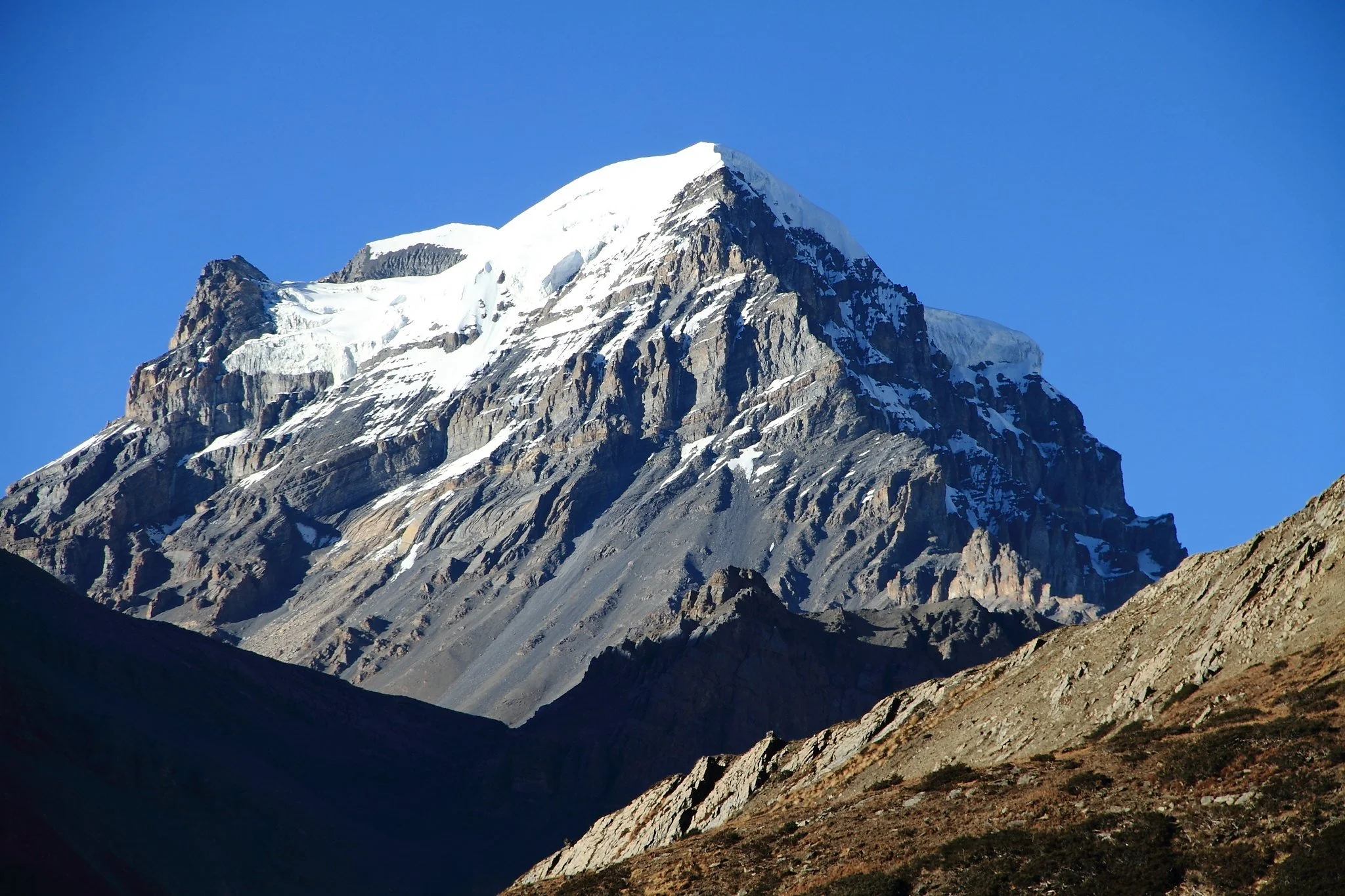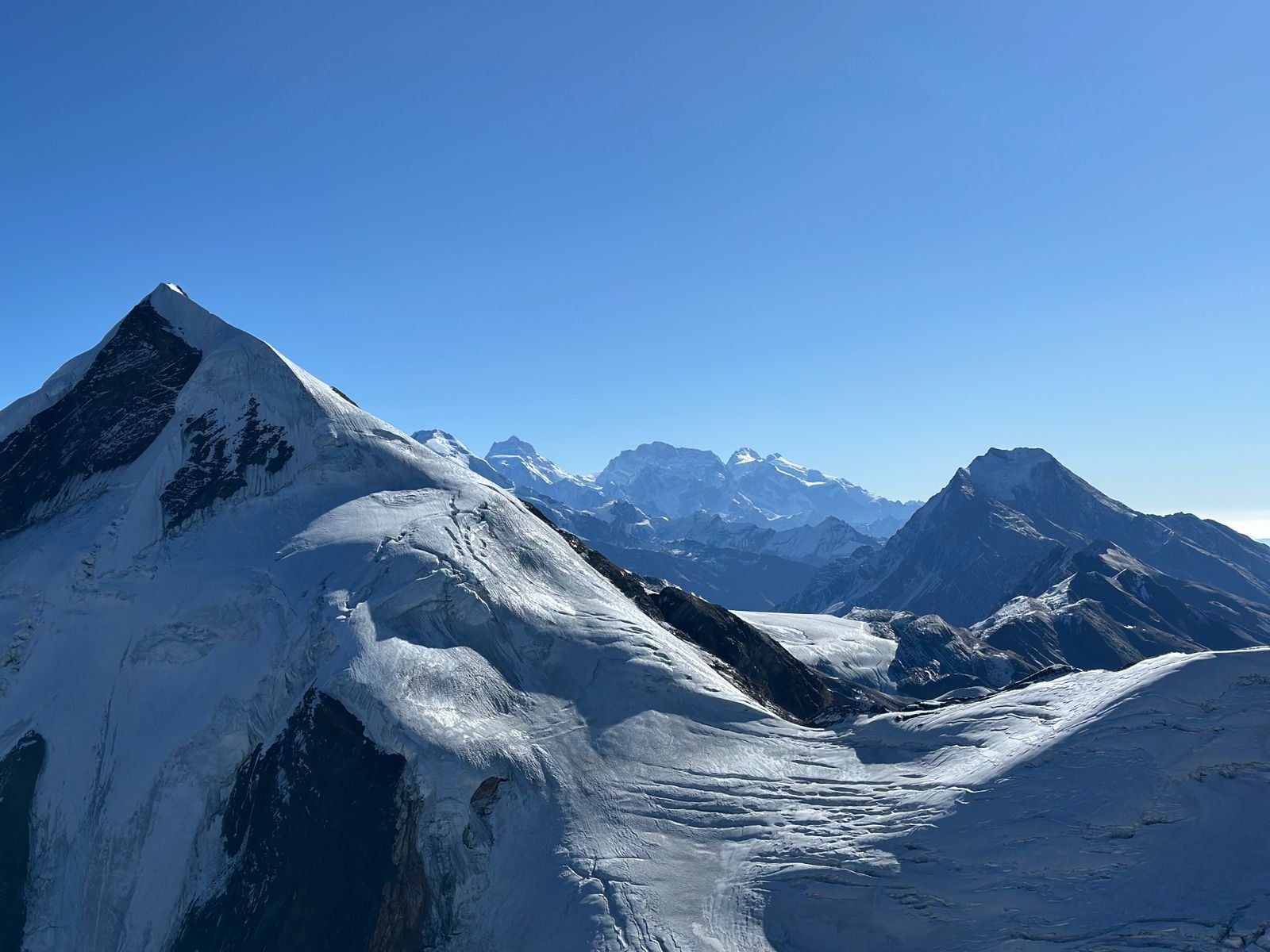
Chulu West 6419M & Far East 6059M
Highlights
Chulu West (6,419 meters) and Chulu Far East (6,049 meters)
Alpine Gear bundle included
Scenic Wonders: Tilicho Lake (4,900 meters), Annapurna Valley, Thorong La Pass (5,416 meters)
Expert Guidance: 1:2 guide-to-client ratio throughout the expedition
Climbing Strategy: Base camp and high camp strategy for optimal alpine climbingOVERVIEW
Join us on a captivating journey through the stunning Annapurna region of Nepal with our Chulu Range Expedition. This adventure combines the majestic peaks of Chulu West (6,419 meters) and Chulu Far East (6,049 meters), offering a perfect introduction to Himalayan climbing. Along the way, you'll experience the beauty of Tilicho Lake, the world’s highest lake at 4,900 meters, and cross the challenging Mesokanta la pass 5100M.
This expedition provides a unique blend of trekking and climbing through the hidden treasures of the Annapurna Circuit. Chulu West, known for its technical challenges, includes navigating crevasses and ascending a vertical 90-degree wall near the summit—ideal for adventurers looking for an exhilarating climb. Meanwhile, Chulu Far East offers a moderately technical climb, adding to the overall thrill of this incredible experience.
Designed for those with a passion for adventure, the Chulu Range Expedition features moderately technical climbs, with Chulu West graded at 2B, making it accessible to individuals in good shape and ready for a challenge. With a 1:2 guide-to-client ratio, our expert team will support you throughout the journey, enhancing your alpine climbing skills as you conquer these awe-inspiring peaks.
Climb and Ski - Join us on a special climbing and ski trip. Only for experienced skiers. Additional cost on ski permit and liaison officer apply.
-
Spring 2025
21st April - 15th May
Note - You can request your own travel dates. Minimum 2 bookings required. Guaranteed departure. Guaranteed departure.
-
$6050 P/P
Please inquire about prices in your local currency. We accept payment in £GBP/ €EUROS/ $AUD
Deposit :$500 P/P required
No extra hidden costs.
-
NMA Certified Sherpa Mountain guide
Nama branded merchandise (Down Jacket, Cap, Buff - for you to take home 🙂)
1:2 Sherpa ratio
1 oxygen system, medical kits
Mountaineering Gears (Gear Include: -23C/-30C Kailas Mountain 900 Down Sleeping Bag or Everest outfit -40C/-40F, 12 Point Kantz Crampons, Climbing, Helmet, Climbing harness, 3X Carabiners, Z-lite sleeping foam mat, L Duffle bag, Ascender)
Cook and assistant team at Base Camp and High Camp
30 Kgs per person (Extra additional weight, clients will need to hire an additional porter. Estimated $1000 USD for 26 - 27 days)
2 nights before the expedition and 1 day after the expedition. Hotel in Kathmandu. Twin room/sharing basis. (Should clients return early from their expedition, clients will be responsible for their extra Kathmandu hotel bookings)
All trekking and climbing permits (Khumbu Region Permit and TIMS)
All internal-local transportation to and from the trekking trailhead
3 sets of meal for Breakfast, Lunch and Dinner on trek and expedition days.
Lodge accommodation during the trek
Porters
Arrival pick-up and departure
Internal flights
Basic First aid kit
Welcome or Farewell leave Dinner
-
Visas and travel insurance
Summit Bonus tips ($400 P/P)
Entertainment and food (Kathmandu or Pokhara)
Bottled drinks and beverages. We suggest $500 (NRS 50,000 to purchase wifi cards, bottled water, sodas, bars, charging, etc miscellaneous expenses)
Evacuation (will be done in your account)
Tips (Service Charge in Hotel and Restaurants are included)
Single supplement Charges
Laundry, Phone services, Personal expenditure transactions
Optional trips
Tea breaks, chocolates or other snacks, and any meals besides breakfast, lunch, and dinner.
Delay and cancellation because of natural phenomenon
International flights to Kathmandu
Clients Expedition Images
-
$800 USD Only applies if there is only 1 client member.
ITINERARY
Day 1 -2 Arrival, pick up at the airport by Namas staff. Briefings and gear check.
Day 3 Drive to Besi Sahar 5 - 6 hours
Day 4 Drive to Humde
Day 5 Acclimatistion hike day Ngawal (3250M)
Day 6 Ngawal to Yak Kharka 3800M
Day 7 Yak Kharka to Chulu Far East BC 4600M
Day 8 Chulu Far East high camp 5400M
Day 9 Chulu Far East Summit 6049M and back to BC
Day 10 Contingency day
Day 11 Trek to Manang village (3540 m) 7-8 hours
Day 12 Manang (3540M) - Ledar
Day 14 Ledar to Chulu West Base Camp (4900M)
(4 Days of climbing, BC, porters up to HC high camps, rotations, summit, contingency and back to Ledar from HC)
Day 14 High camp (Porters )
Day 15 To Camp 1 (6100M)
Day 16 Summit and Back to High Camp
Day 17 Contingency (for bad weather day)
Day 18 High camp to Ledar
Day 19 Ledar - Tilicho BC (4000M) : 4 - 5 hours
Day 20 Tilicho Lake 4900M to Mesokanta la pass 5100M - Yak Kharka
Day 21 Trek to Jomsom
Day 22 Jomsom - Pokhara (Via Jeep)
Day 23 Pokhara Rest Day
Day 24 Sunrise at Sarangkot and Kathmandu (Afternoon late flight)
Day 25 Departure
ACCOMMODATIONS
Day 1 - 2 to 23-25 (Kathmandu and Pokhara)
HOW DOES IT WORK?
1. Initial Inquiry and Planning
At NAMAS Adventure, we start by understanding your aspirations and goals. From your first conversation with our expert team, we provide personalized recommendation tailored to your interests. Once the perfect expedition is identified, a deposit secures your spot. We then work closely with you to plan and prepare every detail—from gear selection and training advice to arranging insurance, permits, and logistics.
2. Preparing for the Journey
As your expedition date approaches, we’ll help you finalize all preparations. This includes collecting the final balance payment (typically due 60-90 days before your trip), ensuring all necessary documents are in order, and addressing any remaining questions. Our team is available via email or phone calls to make sure you’re fully prepared and confident for the adventure ahead.
3. On-Expedition Support
Arrive at your destination ready to begin! From pre-expedition briefings and gear checks to the full support of our experienced guides and ground team during your climb, we’re here to ensure everything runs smoothly. With flexibility to adapt to any changes or needs, we’re committed to making your adventure seamless, enjoyable, and unforgettable
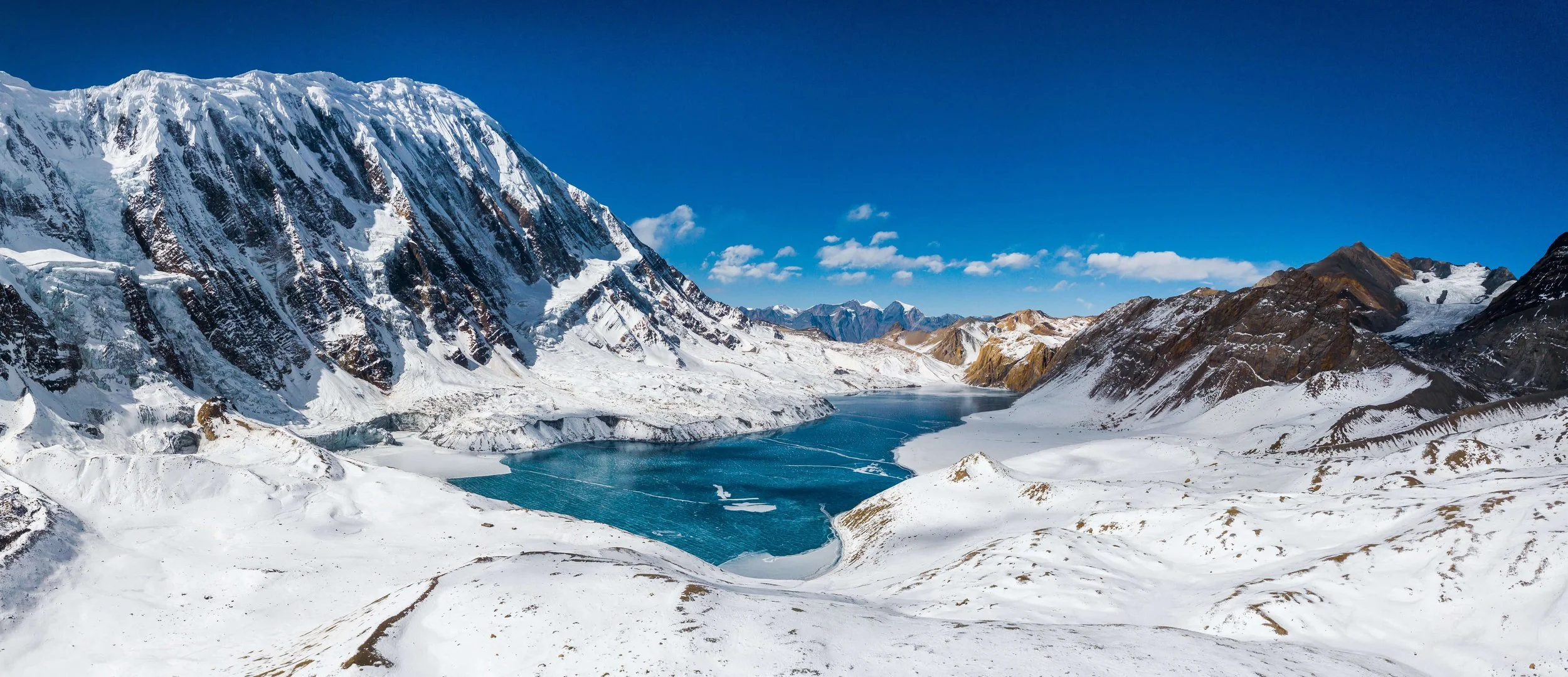
FAQ'S
When is the best time to plan for Annapurna Three Peak climb?** . . .
April - May or September - November
(We do not recommend travelling to Annapurna region during the month of June, July or August due to heavy rainfall in Nepal with Monsoon season.)
Which route will Namas team choose? I can see the mountain is very steep and exposed, What is your climbing strategy?** . . .
Chulu Far East is considered a non technical trekking peak in the Annapurna region and the least technical high altitude climbing peak in the itinerary.
Pisang Peak is a semi technical climbing peak in the region. We will climb the south route.
Chulu West is the highest and semi technical climbing peak in this itinerary. We will be climbing the south east ridge route to summit the peak.
How long is a typical climbing day on the mountain?** . . .
On normal climbing day can expect an average of 6 hours climb on each peak. Summit attempt days are usually the longest one, as we have to descend down to the nearest village or base camps.
What is summit day like?** . . .
Summit day in Mera is the straightforward climb up to the summit with few crevasse openings along the way, which poses minimal risk. We will be mostly climbing through ice and snow terrains and will be a early day (am) start to the summit.
Can I see Annapurna from the summit?** . . .
You won't be disappointed by the vista the climb offers. Annapurna II, IV, III and Gangapurna is visible from the summits.
Contingency Days?** **. . .
We do not have contingency day added in our itinerary but can be extended upon request if our team is not able to summit due to bad weather conditions.
Guides /Sherpas for Annapurna Three Peak climb? Ratio : clients. Qualification and level of English?** **. . .
On this expedition we aim to have max 8 climbers, we have 1 lead guide and additional guides (number dependent) who will be NNMGA certified. Additional* charges apply. Nepalese certified guides are more than capable in this day and age and have an excellent level of English. We are committed to responsible tourism and want to enhance and prioritise local Nepalese leaders first, but if the clients request a western guide personally then we can have that arranged.
Sherpa ratio 1:2. Our Sherpas are NNMGA (Khumbu climbing centre trained/certified). Personal Sherpa for 1:1 can be arranged who will be solely responsible for the clients but extra additional charges apply. Our Sherpas have an intermediate level of English. Can understand, reply and instruct very well.
How much tips do you suggest for guides and porter teams? Summit tips?** **. . .
Most of our guest give tips during the end of the trek/climb. Your booking payment already consist a tip pool of $300. We will fairly distribute the tips among your drivers, assistant guides and porters.
Guest also donates trekking equipments like jackets, trek poles, gloves or hats to porters which is greatly appreciated. Guest can also buy our porters dinner, during the final day of the trek for all their hard work and for making their trek possible
Suggested Additional Summit tips $600.
Is Annapurna Three Peak suitable for beginner climbers and what level of fitness do I need? **. .
Yes, all the three Peaks suitable for all beginner level climbers. Chulu Far East itself is a non-technical high altitude trek/climbing mountain. To reach the summit of Chulu Far East 6049M you do not need any special climbing skills such as climbing on ropes using gears or use of ice axe. The mountain has less to non-technical challenges, there are 3-4 small opening crevasses during the climb but apart from that, the climb is straight forward. All climbers are recommended to partake in preparative fitness training 3 to 4 months before the departure date. You should be able to carry 5-8 kgs of your bag pack, walk up and downhill every day for 15/16 days and be able to push yourself during the summit climb.
Chulu West and Chulu Far East are semi technical climbing peak. Climbers will have to use fixed line ropes and abseil down from the summit. With guidance from our guides climbers should be able to climb these peaks as well.
Summit climb to all the mountains will demanding. That is why we highly suggest you train well over 10-12 weeks before your trip. You will need good endurance and body strength. Aerobic exercises mixing with overall body strength building routines should help you prepare physically for your trip. Another aspect is your mental strength. We would say any mountaineering experience is more about testing your mental strength, to push forward and take on the challenge of completing a great adventure and being exposed to new uncomfortable environments.
How do I know this is the right trip for me? . . .
All three Peak climb is a 6000M peak climbing adventure suitable for all beginner/novice climbers, this mountaineering adventure really depends on your ambition to go on a great challenging climbing adventure. To help you clarify if this is the right peak climbing adventure for you, [our grading][2] system can help you determine if this is the right expedition and if it is the right time to take upon trips of such nature. If you are yet unsure please do contact our team and we will walk you through where you are in your current experience level and guide you into choosing the right adventure.
How many guides/ Sherpas will be assigned to our group? . . .
1:2 Guide client ratio
How many in a group? . . .
Min 2 - Max 8
Who is this trip for? . . .
All interested climbers, 18+ who is looking for a beginners/intermediate experience level climb. 15-17 years old must be accompanied by adults
Who goes on this Peak climbing adventure? . . .
Climbers from all over the globe with different backgrounds, interest and mountaineering skill level join our expeditoin.
Can my friends and family join me on the trek to Khare? . . .
Yes, it is possible. Please email us about this and give you relevant informations.
Can I contact other climbers to join me on this trip? . . .
Yes, we highly encourage that. Maybe its your friend with whom you have been on amazing/challenging adventure trips before, a you met during your other expeditions, a challenge you seek together or any other ideas where you think the other person might enjoy this amazing climb.
Baggage allowance by Namas Expedition team for Khumbu Three Peak Expedition ? . . .
We allow 30kgs of personal weight.
Is it possible to organise a private climb? . . .
We will be more than happy to organise private trip for you and your group. As long as it is with in the suitable season. Extra cost will apply as we will have to organise a seperate logistical and planning for private climb request. Please contact our team for any private trips or expeditions.
What fitness/conditioning level is needed for this climb? . . .
You need to be in excellent shape for this climb. Although all the Peak climbing is supported by Sherpa guides and ropes, due to the technical nature of the peak, it is critical that you are in the best shape possible.
Technical preparation and trainings for this trip? . . .
Climbers should be able to at least have the understanding of safety rope knots, abseling and ascending when climbing and descending.
How hard is it to climb to the summit of all the peaks? . . .
Chulu Far East Peak is classed as 1B alpine grade. Chulu West and Pisang peak are graded 2B. When it comes to expedition the more fitter you are and more stronger the better your chances of successfully climbing to the summit and most of all enjoying the expedition. Summiting Mera Peak mostly depends on the weather condition and your fitness level. The climb normally starts around 3/4 am in the morning and it is about 3-4 hours climb to the summit. For any climbers, it is a technically straightforward ascent. The main hurdle being proper acclimatization to the high altitude.
How heavy will my bagpack be? . . .
You will just need to carry your personal items and most of your heavy gears are carried by our porter team.
How do you I train for a trip like this? . . .
We have written blog post on training for mountaineering which can give yo a guidance and tips on how long to what type of training you should undertake to train yourself well for challenging peak climbing adventures.
Physical fitness needed for this climbing trip? . . .
You need to be in a great shape for this climb. Due to the non technical nature of the peak, it is very important that you are in the best shape possible. Also, as Sherpa support is moderate on this climb, you are expected to be able to carry all of your personal gear needed for the climb. Sherpa teams are primarily responsible for carrying group gears to the camps.
Which Mountain can I aim for after Annapurna Three Peak climb thats above 6500M? . . .
Our main suggestion is take it one step at a time. The lure of Everest is there but taking small steps, gaining right experience and understanding your physiology is very crucial for climbing extreme high mountains. Amadablam 6810M, Baruntse Peak 7129M, Manaslu 8163M, Tilicho Peak 7134M are some of the 7000M+ - 8000M+ Peak expedition we organise at Namas adventure.
What sort of hotels do we stay at in the city? . . .
All Namas expedition team stays at the Hotel Manalsu or Tibet in Kathmandu. Arrivals hotels are only 15 minutes walk from the tourist centre of Thamel. Our chosen hotel provides swimming pool, restaurants, spa and massage near by and plenty of local shops near by to buy souviners.
What are the lodges like? Can I have my own room or tent? . . .
Lodges or tea houses we use during trekking days are local Sherpa tea houses. You will love the cultural ambience of the tea houses. Places we book are kept tidy, clean, modern lodges—the best that are available in each village. They are well-known locations to us and we have a good relationship with the lodge owners. Private rooms can be booked at additional cost. Our standard trips are based on shared rooms, usually twin-share and sometimes triple-share. On the mountain you will share a tent with one, or sometimes two other climbers.
If you would like a personal tent during Expedition days, Base camp personal tent can be arranged. Please do let us know in advance so that our team can make the necessary arrangements.
How many nights will we sleep in our own tents during the trip? How many nights in small houses on the way, are those heated? . . .
During alpine camping tents; at all base camps and high camps. On the trails we will be sleeping in Tea houses. Almost all the houses in every trekking routes of Nepal are built the same way. The Dining hall is warm and heated but all the rooms aren't so once we are in our rooms we will have to depend on our clothes, blankets and sleeping bags to keep our self warm.
Will Showers and laundry be available? . . .
On our trekking days tea houses we stay will offer hot showers and laundry services for a small fee.
Is foods included in our booking fees? . . .
All our expeditions are all-inclusive. Breakfast, lunch and dinner as well as ample hot and cold drinks during trek and expedition days are included. We can cater for vegetarians as well as many other special diets as long as we are informed of this prior to the trip.
What are the food like? . . .
During the trekking days in tea houses mostly foods are prepared according to your choice in the menu. Rice and Lentils (Dal bhat being the famous diet) to pasta, soups, pizza, mash potato, dumplings etc. But during the camping days we provide both cooked and packed/canned food supplies packed from Kathmandu.
Options are limited during camping days. Mostly Rice/lentils/veg/ pasta for cooked foods and freezed dried foods, chocolate/energy bars, biscuits, hydration tablets. We will have varieties of freezed dried foods (chicken, veg, spaghetti etc ) which are specially made for expeditions.
Will you provide all the equipment to produce drinking water? . . .
Bottled waters can be bought everywhere. Boiled waters are also available on the lodges. Or we would recommend bringing your own water treatment kit or filtered water bottle. (Lifestraw filtered bottles). Water Treatment: Iodine tablets (Potable Aqua or similar) or iodine crystals (Polar Pure)
What is the best way to get to Nepal? . . .
You will need to search for flights to Kathmandu Tribhuvan Intn'l airport. Regular flights operate into Kathmandu via Bangkok, Doha, Dubai, Trukey, Hong Kong, Singapore and Delhi.
Do I need to get a visa for Nepal? . . .
Yes. For most nationalities, a visa can be obtained on-arrival into Kathmandu airport or border entry points or can be issued prior through an Nepalese embassies or consulated abroad. Upon arrival, be sure to have the correct USD amount in cash for your visa application and photos can be take through the kiosk machine available at the airport. Currently, a 40-day visa costs $40 and 90-day visa costs US$100. Please dp make sure that your passport has at least six months validity.
Do I need to arrive the day before the trip starts? And when should I book my flight to leave? . . .
We have got you all covered. All our trip programme itinerary already have an arrival day and a departure day built into them. Please plan to arrive at early hours on Day 1 of the itinerary. If you plan to come early and explore Kathmandu then you are welcome as Kathmandy offers tons of culutral experiences. If you would like a 1-2 days tours please do let us know and we can provide suggestions. Namas Nepal representative will meet and pick you up at the airport and the first of many team briefings will take place on the evening of Day One. Please do not book to depart before the scheduled final trip itinerary day. All the details will also be sent on the final email.
When should I book my ticket? . . .
We recommeend you to book 90-60 days prior to your trip start date to ensure your trip has met the minimum numbers and will operate. If you see a good deal and want to book your flights, then ensure that you can make changes to your ticket or you run the risk of losing it if we do have to cancel the trip. In such situations, we are usually able to help you book on to an alternate departure, either with us or another operator.
Can I get a cheap ticket online? . . .
Yes, please make sure you have a flexible departure date on your ticket. With the nature of our expedition and the places we do are not straight forward as we due to unforseen cisrumstances we might have to add 1-2 days extras to complete our expedition which will lead to extension of our itinerary. In those circumstances you do not want to end up paying extra for your departures.
Where do we meet? Will I be picked up? . . .
As you arrive in Kathmandu, Namas guide or representative will receive you at the airport with our shuttle car/van. If you are arriving before the scheduled trip start date and want to be receiced at airport then please do let us know in advance and we can make the arrangements to pick you up. Or there are airport taxies to help you.
What if I am arriving early or departing late? . . .
Namas team can make necessary arrangements or recommendations should you want to explore more of Nepal. Please do let us know in advance or even to our team in Nepal to help you with these matter.
